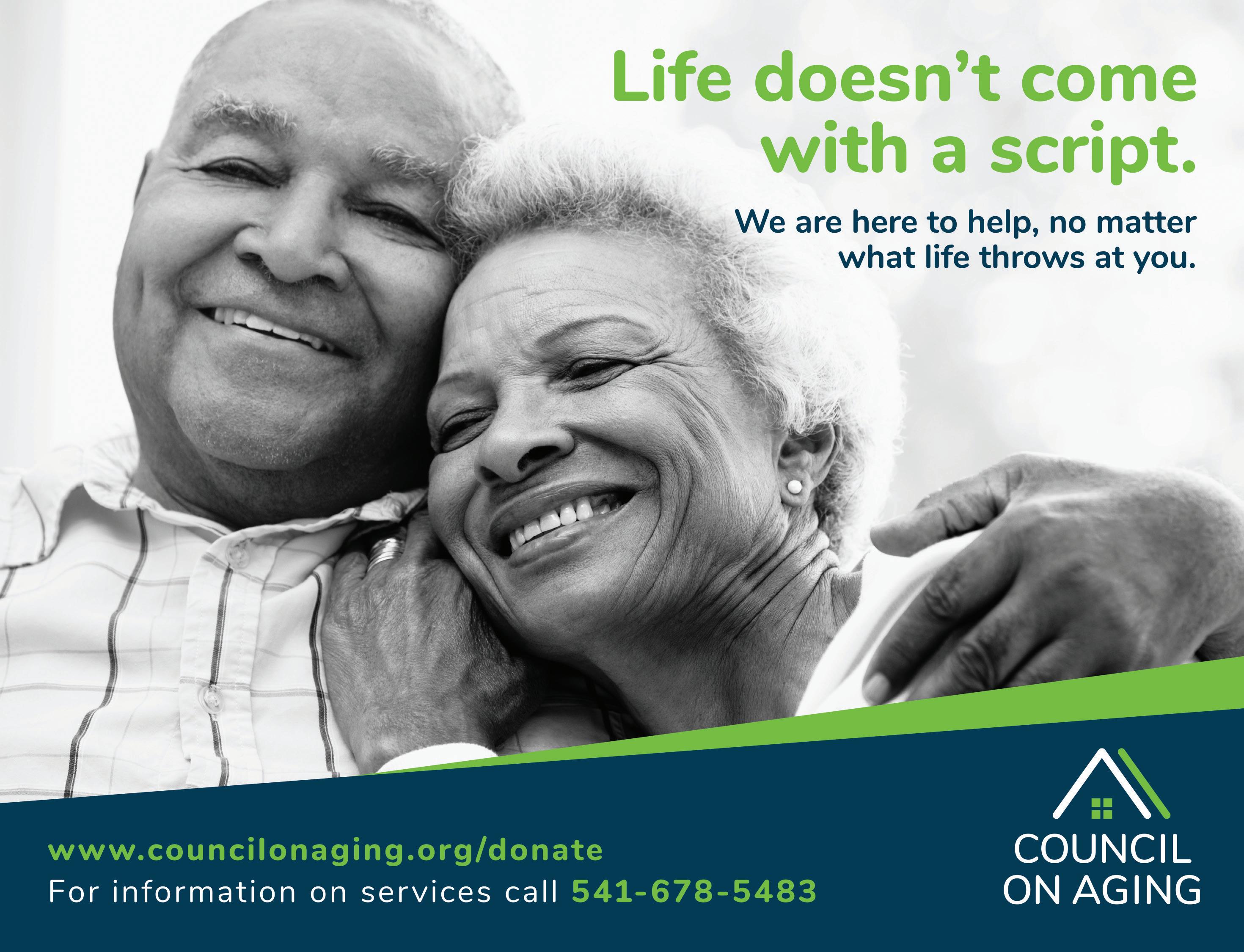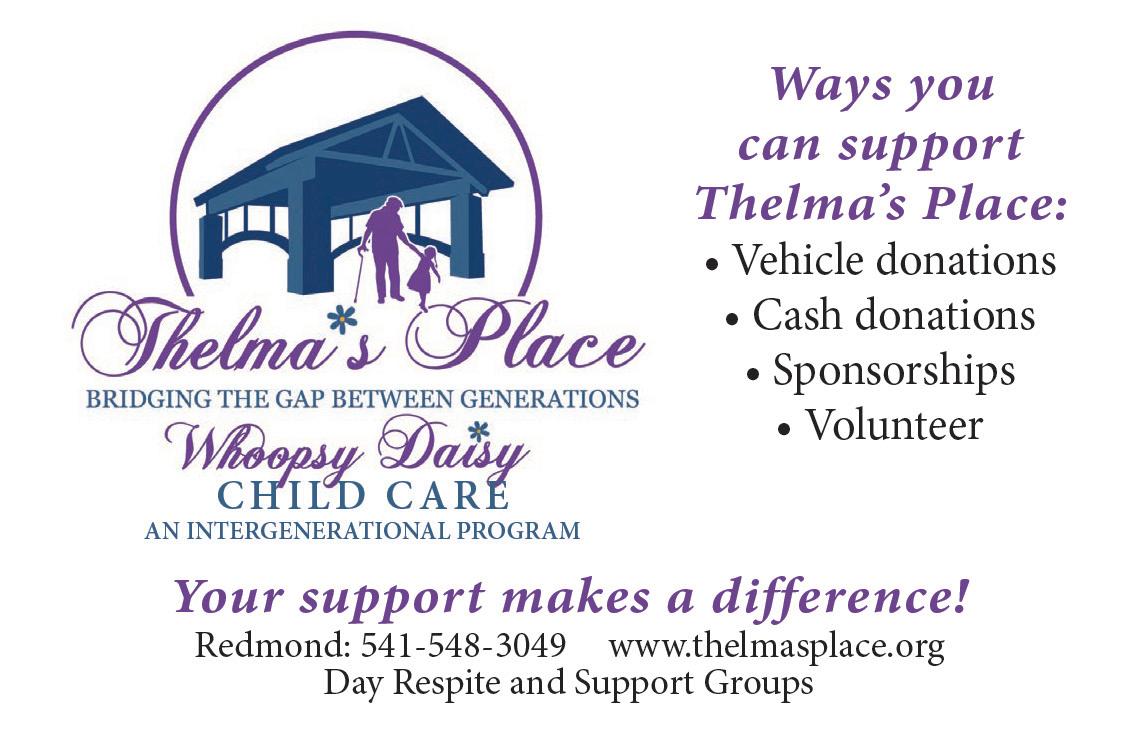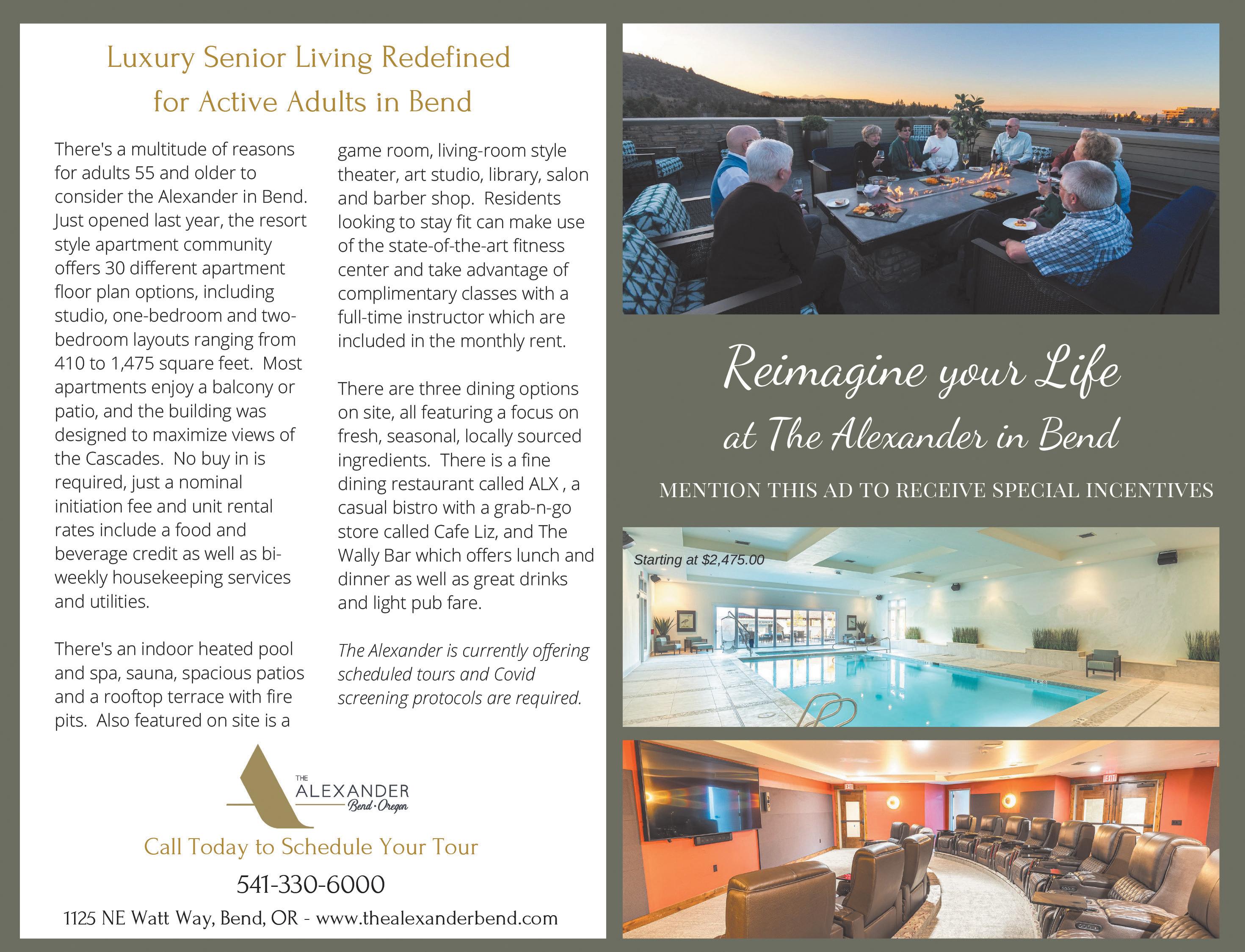
37 minute read
Of a Certain Age
Of a certain age... Living the best years of your life in Sisters
Living with passion
By Jim Cornelius | Editor in Chief
“I’ve always lived life with passion,” says Erik Dolson. The Sisters man, one-time publisher of The Nugget Newspaper , is a writer, an automobile racer, a sailor — and at age 70, he still feels the need for speed.
Dolson has been racing a vintage Corvette with considerable success over the past 25 years. Over the Labor Day Weekend, Dolson was the recipient of the Zupans Markets Historic Races Pete Lovely Award, voted upon by the crews who work the races.
“This means much to me,” Dolson wrote in a reflection on the honor. “You who work the flag stations, the starting grid, the tow trucks ... you not only make racing possible, you see it all, for long hours in bitter cold or blistering heat, risking your own well-being to keep drivers safe, sometimes saving lives. Your recognition is something I value more than any checkered flag.”
Last year, Dolson was awarded the Wemme Trophy, a lifetime-achievement award recognizing significant contributions to Portland vintage racing.
Dolson took up racing at age 45 — and sailing at age 65. Is the drive toward pursuing new adventures later in life a choice or something innate? Hard to say.
“There are a lot of options,” Dolson told The Nugget. “One is to not do anything — by choice, I suppose. Take it easy. There are those, unfortunately, who can’t do what they used to do or want to do. I am incredibly fortunate that I am able to pursue passions that I’ve had for decades — and pick up some new ones.”
The passions may be innate, but the effort to pursue them takes deliberate effort.
“The conscious choice is when I go run the river trail two or three times a week, or I go to the gym three times a week to maximize my physical capabilities — or as I prefer to say — make the world a lighter place.”
In addition to maintaining physical health, there are advantages to age that enhance mental, emotional, and spiritual well-being.
“I am more grateful now — for so many things — than at almost any other time of my life,” Dolson said. “I think this comes with perspective, which comes with age. Gratitude displaces a lot of negativity, which can be so corrosive.”
A recently-acquired joy is riding an electric unicycle. The unit, which is steered off the rider’s balance, can achieve speeds of 35 miles per hour — which is quite a lot when there’s nothing separating the rider from the pavement. Dolson uses it to run into town from where his sailboat docks — and to simply enjoy himself.
Whenever the unicycle comes out, there are stares — and even friends can be a little aghast at what he gets up to.
“I occasionally get the rueful shake of the head,” he


Erik Dolson, 70-going-on-15, whipped around the parking lot at Fika Sisters Coffeehouse last week on his electric unicycle.


acknowledged. “They’ve probably been shaking their head at me for the last 40 years. Acting my age has never been my strong suit.”
The septuagenarian can’t quibble with their judgment.
“I don’t disagree with them,” he said with a wry laugh.
He noted that when he crashed on his unicycle a few months ago and injured his shoulder, “I wondered if I’d taken it a step too far. But the shoulder healed.”
And Dolson climbed back up on the wheel. He’s not planning on stopping. One of the advantages to taking up avocations that some might find outlandish when you’re past middle age is that you’re well past worrying about what others think about it.
“I’m there to feel the joy of balanced movement,” he said. “And it doesn’t matter if someone thinks I’m indulging in risky behavior.”
It’s not risk per se that drives Dolson. He noted that he gave up flying because he considered himself a mediocre pilot.
“And I thought that was a bad thing to be,” he said.
More than risk, Dolson is drawn to challenge — the challenge of pushing himself and a race car to the limits, or learning to sail, navigate, and maintain a sailboat as a way of life.
“There is joy in doing something well,” he said. “There is challenge in learning new skills and there’s satisfaction from meeting that challenge.”
And a fellow rider recently told him about a wheel that does 45 mph…


Services for seniors more critical than ever
By Jim Cornelius Editor in Chief
The population of Sisters Country is aging — and the challenges of aging are exacerbated by the coronavirus pandemic.
Seniors who might be facing a higher degree of isolation due to lack of transportation or connection are even more inhibited by the need to stay socially distanced.
Central Oregon Council On Aging (COCOA) has worked to bring Sisters seniors out of isolation with senior lunches at Sisters Community Church. Those activities have been curtailed — but the organization has pivoted to keep connecting seniors with services and social interaction.
COCOA Communications Director Denise Labuda noted that the organization is specifically designated to assist struggling seniors — those who don’t have the resources and wherewithal to access the services they need. They serve as a primary point of contact for seniors and their families to work through issues with housing, food access, in-home care, medical assistance, transportation and help for caregivers.
“We have a variety of services we can connect people to and in some cases pay for — but we are not the provider of those services,” she said.
COCOA is noted for its lunch program in Sisters, which switched over to a to-go model in order to maintain COVID-19-safe protocols. Labuda noted that they are actually serving three times more people than they were with their sit-down dining. The service is offered at Sisters Community Church from noon to 12:30 p.m. on Tuesday, Wednesday, and Thursday.
...we believe we’re going to see more with isolation and loneliness… We’re trying to get ahead of what we think is going to be a hard winter for seniors. — Denise Labuda
“I’d say we’re feeding about 70 people in Sisters right now,” Labuda said.
Maintaining that social connection is critical to the mental, emotional, and ultimately physical well-being of the seniors COCOA serves, and Labuda and the rest of the staff are acutely aware that more challenges await as Sisters Country slides into winter.
She said the program may move to a delivery model when weather makes it dicey for seniors to be on the roads.
COCOA also connects seniors to Meals-on-Wheels delivery.
“Meals-on-Wheels drivers no longer go into the home to drop off the food or sit down to have a conversation,” Labuda said.
However, she said, they’ll still talk outside, and “we are also dedicating staff to call them once a week.”
Labuda said that COCOA is also developing a volunteer-based calling program to offer seniors some connection during the cold months, when isolation is expected to increase. Labuda told The Nugget that food insecurity is the biggest issue for seniors in Sisters, “and we believe we’re going to see more with isolation and loneliness... We’re trying to get ahead of what we think is

going to be a hard winter for seniors.”
Individual seniors are only part of the picture when it comes to caring for the elderly population. Their families play a big role too. Labuda said that COCOA helps families come up with a plan for loved ones as their needs change — needs for housing, food, medical care and more.
And for family members who are carrying the load of care, the organization can connect them with respite care services.
COCOA offers Medicare counseling, and the season for that service is fast approaching.
“We’ll start taking a p p o i n t m e n t r e q u e s t s on October 1,” Labuda said. “This year will be phone only, again because o f C O V I D - 1 9 s a f e t y concerns.”
COCOA is open Monday through Friday, 8 a.m. to 4:30 p.m. Volunteer inquiries are welcome.
Labuda wants families in Sisters to know that, whatever their need, Central Oregon Council on Aging should be their first point of call, making it easier to navigate through the range of services available to ensure and enhance quality of life for Sisters’ seniors.
Nutrition essential for health
By Jodi Schneider Correspondent
When you’re enjoying a great slice of pizza, you’re probably not thinking about the vitamins, minerals, and other nutrition it provides: the lycopene in the tomato sauce, iron in the meat, calcium in the cheese. Or the carbs, fat, and protein that help your body run.
Basically, your diet is like your medicine cabinet. Every time you reach for an apple, chips, or peanut butter, it’s like taking a drug that’s promoting health or hurting it.
Eating a well-balanced diet is an important part of remaining healthy as you age. It can help you maintain a healthy weight, stay energized, and get the nutrients you need.
Nutrition has a huge impact on the physical health and well-being of older adults. Many people may not realize that nutrition needs vary depending on a person’s age. Just like toddlers have different dietary needs than teenagers, nutritional needs for older folks are different
See NUTRITION on page 25
Sisters man defies ‘numerical age’ taking second in bike race
Jack Addison thinks that the Sisters Stampede is a perfect venue for folks in Sisters to defy the limitations of “numerical age.”
Usually held on Memorial Day Weekend, the Stampede, organized by Mudslinger Events, was moved this year to Labor Day Weekend due to COVID-19. The event was held under modified protocols to address COVID-19 safety. The course was one length for all for a staggered start. The course was 18 miles, plus an additional two miles biking to the starting line. “My time was one hour, 46 minute, no stops, no aid

Estate planning
PHOTO PROVIDED stations — due again to COVID,” Addison, age 78, reported.
That was good for a second-place finish in his age group of Over 70.
Addison advocates more local participation in all categories, but especially the Over 60 and Over 70 (new this year) categories.
“Just as the Sisters school athletic programs spend most of the energies getting ready for actual contest events, for us ‘post-high-schoolers,’ preparation for even one mountain biking annual event causes a year-round preparation and participation in truly healthy living,” Addison said.
He describes that way of living as “full of self-generated optimism and energy much more rewarding than a blue and white handicap parking decal which isn’t hard to talk one’s doctor out of.”
Since the Sisters Stampede is normally held every Memorial Day, Addison conspicuously wears a small American flag taped to his helmet to remind people of the “why” of the event.
Addison, a fighter pilot in Vietnam in 1966 says he specifically dedicated his racing effort to honoring the veterans that died in military action and those who almost died torturous deaths as POWs.
“Certainly, it would be great if more veterans or veteran supporters wore flags on their helmets on next Memorial Day in the next Sisters Stampede 2021,” he said.
Addison notes that, “this type of vigorous activity is encouraged by cardiologists supporting cardiac rehab for many of their patients. Of course, persons who have had cardiac events should query their surgeons directly regarding the level of activity recommended for the individual patient. The staff at St. Charles has programs for cardiac patients that support exercise at levels that might surprise many patients, as
Are you happy with your ability to balance?
Do you ever experience dizziness, vertigo, motion sensitivity, nausea, difficulty with visually complex backgrounds, imbalance or difficulty keeping visual focus
with movement? Your vestibular system might need a tune up, as it declines over time (faster than visual). There are simple exercises that can make a tremendous diff erence.
Please contact our offi ce with any questions you may have. Cheers to staying safe, engaged, confident, and doing what you love! during a pandemic
— Annie McDonnell, PT - Trained in Vestibular Rehabilitation at Emory 541-549-3534 | 325 N. Locust St., Sisters | www.greenridgept.com
well as support better nutrition that is very complementary to a vigorous lifestyle.”
The Sisters athlete says that, “it’s never too late to adopt the double application of real exercise and a diet that one can adopt as a lifestyle rather than a temporary diet ‘to lose weight’ that simply returns for the vast majority. We can individually stop the life-shortening obesity epidemic that marches on. Sisters is fortunate to have multiple sources of gyms and individual trainers that have core development and sound core workouts.”
There’s no getting around aging — but Addison defies “getting old.”
“Aging is numerically automatic, but getting old involves lots of insidious choices and media-sponsored cultural habits that do not serve us well. In short, get even by unplugging the TV, eat well and move, move, move,” he said. “There is no need to fall victim to any particular numerical age.”
The coronavirus pandemic has certainly caused havoc and concern for many people, particularly in regard to their health and their finances — and these two areas intersect in estate planning. So, if you haven’t drawn up your estate plans yet, or you think they may need to be revised, now may be a good time to act.
This suggestion is not strictly based on issues of morbidity — after all, the vast majority of people who contract COVID-19 will survive. However, even if you never become ill or need to be hospitalized, wouldn’t you be glad to know your affairs are in order? If you already have estate plans, you may need to revisit them if your family situation has changed because of marriage, divorce, remarriage, new children, new financial goals, and so on.
Of course, estate planning can be complex, so there’s not a “one size fits all” approach. Nonetheless, here are some of the most commonly used documents and arrangements:
Financial power of attorney: A financial power of attorney is a legal document that gives someone the authority to conduct your financial affairs – pay bills, write checks, make deposits, sell or purchase assets – if you were unable to do so yourself. You can establish the financial power of attorney without giving your representative any ownership in your assets.
Last will and testament: With a last will and testament, you can choose how you want your assets distributed, appoint an executor to oversee the distribution and name a guardian to take care of minor children. If you don’t have a will, a court might assume these functions, with results you might not have wanted.
Living trust: A living trust allows you to leave assets to your heirs without going through the time-consuming, public and often expensive probate process. Also, a living trust gives you significant
Open Enrollment Starts November 1!















Have questions before enrolling or changing plans?



Call our local COUNTRY Financial ® Representative, Linda Alldredge at 541-549-6946. Your appointment is FREE!



Linda Alldredge L 541-549-69465 178 S. Elm St., Ste. 100, Sisters1 0 Si t
linda.alldredge@countrl yfi nancial.com | countryfi nancial.com/linda.alldredge Health insurance policies are purchased through CC Services Inc., from a third party insurer not affiliated with COUNTRY Financial. Availability differs by state. 0720-160
The high price of living out loud
By Jim Cornelius Editor in Chief
In his 20s, Jack McGowan had a dream job.
“I was an FM DJ for Portland’s top rock station,” he recalled.
He spent four hours each day with headphones on, cranking up the music now considered “classic rock.” He interviewed many of the luminaries of the rock-androll world and reveled in an era of music whose breadth, depth, and quality may never be repeated.
But he paid a price.
“I think that was the origin of my hearing loss,” he said.
He’s not alone. Many people of his generation are living with the consequences of a youth spent at high volume in every activity.
“When you’re doing that as a young guy, you have no thought for what it’s going to be like when you’re 70,” he said.
What it’s like is not nearly as cool as rock and roll. Hearing loss can mean increasing social isolation, frustration with yourself and loved ones — and a diminished quality of life.
“The highs completely rolled off in my hearing,” McGowan recalled. “Crisp sounds were no longer there; it was like I had socks in my ears.”
Conversation got more and more challenging, especially in a crowded restaurant or when the person speaking wasn’t looking directly at him.
“I’d have to say to Jan (his wife), ‘Would you turn around and talk to me,’” he said.
Finally, friends sat him down and told him he clearly needed to address his hearing loss. They told him: “We know your quality of life is suffering.”
McGowan’s scenario is one that Lanie Tandy of All American Hearing in Redmond sees over and over again. Either through complacency, stubbornness or fear of the expense of acting, people choose to live with hearing loss that has an obvious negative effect on their lives.
She sees couples whose relationship has become strained because of constant misunderstandings, or the sense that your partner is not listening to you. One partner will repeat himself over and over and end up shouting.
None of that is beneficial.
“For most types of hearing loss, louder is not better,” Tandy notes.
The problem isn’t volume; as it was with McGowan, it’s about the ability to distinguish sounds.
“It causes a tremendous amount of frustration and conflict,” Tandy said.
So often, she has heard a patient say, “It’s not that I don’t want to hear you.”
Hearing aids can provide a life-changing improvement to the deteriorating quality of life associated with hearing loss.
Tandy feels a calling to encourage people to act as early as possible when they notice diminishment in their hearing. Get tested; identify exactly what is going on and seek correction.
“No one is excited to come in for their first set of hearing aids,” Tandy acknowledges.
Once they’ve done so, though, Tandy hears a common refrain: “Almost everyone says, ‘I wish I’d known sooner.’”
McGowan admits to some resistance to getting hearing aids. It’s hard to acknowledge diminished capacity. He also recognizes that that outlook is silly.
“Hearing aids are glasses for your ears,” he said. “That’s all it is. There should be no embarrassment.”
Perceived cost is another significant barrier for some people who are convinced that they just can’t afford hearing aids.
“I never, ever want cost to be the reason someone doesn’t come in and get their hearing addressed,” Tandy told The Nugget. “We can find a solution.”
Hearing aids can range from quality refurbished devices to state-of-theart “smart” units that have onboard artificial intelligence that can monitor your degree of social interaction.
That social interaction is more and more important as we age and social isolation becomes a bigger and bigger issue. The longer a person has retreated into the isolation imposed by hearing loss, the harder it is to come out.
“Isolation and social disengagement is probably the biggest thing I see my patients struggle with,” Tandy said. “They’ll get hearing aids, but they won’t engage in social activity or expose their ears to new listening environments. It’s become such an issue in hearing loss that (monitoring of interaction) has actually been incorporated into the new technology.
“Aural rehab” becomes part of the process of regaining quality of life.





Always Active, Always Engaged, CELEBRATING EVERY SINGLE DAY!
PHOTO PROVIDED Jack McGowan spinning vinyl in Portland. Decades of rock and roll are hard on the hearing.

“A big part of that is involvement of the family,” Tandy said. “Getting someone back into the world of hearing is a family ordeal.”
Coming back into that world of hearing is a beautiful experience.
“I think it’s akin to watching a black and white TV,”

McGowan said. “All of a sudden the black and white TV turns into beautiful color.”
The Sisters man is adamant that getting hearing aids is worth the effort and whatever expense is entailed.
“It changed my life,” he said. “It really did.”







Housing options for seniors in Central Oregon
By Sue Stafford Correspondent
For those of us of a certain age, we may be addressing questions like: Should I downsize or can I stay in my current home? Where am I going to live if I move? If I become incapacitated or need help with some activities of daily living, who will help? How do I find help and how will I pay for it?
There are numerous resources out there to help make these decisions. Educate yourself about what’s available before you need it. Some housing choices may require getting yourself on a waiting list or paying a deposit. Familiarize yourself with the websites that are full of valuable information and resources to help you.
A D R C , A g i n g a n d D i s a b i l i t y R e s o u r c e Connection of Oregon, is a treasure trove of information to aid in accessing information, tools, and guidance to help plan for future needs before they arise, or to explore options to meet current needs. Find them online or call 1-855-673- 2372 where professional options counselors will speak with you. Their services are free and available to everyone. The website has direct links to everything from housing options and longterm care services to information about Oregon Project Independence and community-based services.
If you elect to stay in your current living situation, be sure you can afford to do that. Do you have enough money to cover the rent or a mortgage, property taxes and insurance, and maintenance of the property AND deal with any potential major medical costs? Is your house manageable for you as you age – are there stairs, for instance?
If you can afford it, modifications can be made to a home to make it more elder friendly and safe. Possible changes might include adding grab bars, ramps, replacing twist water faucets with levers, changing to linear door handles instead of round knobs, widening hallways, and converting a downstairs room to a bedroom.
Visit the consumer help section of the Oregon Construction Contractors Board website or contact Central Oregon Builders Association for information on hiring a contractor to make those changes.
Available online is the free AARP Home Fit Guide, which contains information and tips for a comfortable, safe, and livable home. It also provides guidelines for hiring a contractor.
Another possibility would be to consider selling your home if you own it, and moving to a smaller house, a condo, a retirement community, an apartment, or move in with family or friends.
If you plan to age in place, start making small modifications to your home so it won’t require a great deal of work if or when you need adapted surroundings.
As the ability to live independently begins to decline, it may be time to find some inhome help. Friends and family may be available to assist or you can hire a professional home care worker or contract with a licensed agency that will provide their workers to be of assistance.
Should you decide to privately hire your caregiver, one source is the Oregon Home Care Commission that maintains a statewide registry of potential home care workers and a guide for hiring and working with the care provider (www.or-hcc. org). You can also utilize their Homecare Choice program, which takes care of paying the workers (with the client’s money), withholding and reporting payroll taxes, and providing workers’ compensation coverage for their caregivers. To learn more, call toll-free 1-844-494-4227 and speak with a Homecare Choice Specialist.
When hiring a home care worker through a local in-home care agency, the caregiver(s) is assigned by the agency that also schedules visits and is responsible for employer taxes. Services vary depending on a person’s needs and abilities and can be short-term while recovering from an injury or illness or long-term over months or years. The service can be as simple as regular welfare checks to much more indepth services like bathing, dressing, preparing meals, shopping and transportation.
Most in-home care is paid for by the client, although some long-term care insurance plans cover these services. The client pays the agency, not the caregiver.
O r e g o n P r o j e c t Independence (OPI) serves seniors and people with physical disabilities by providing services while they are living in their own homes. OPI traditionally serves those who are 60 years of age or older or who have been diagnosed with Alzheimer’s or a related disorder and meet the requirement of Oregon’s long-term care services priority rule dealing with level of impairment. They cannot be on Medicaid but can be receiving food stamps and supplemental Medicare beneficiary benefits. A majority of OPI recipients are 125 percent of the Federal poverty level.
Variety of housing options to suit needs, lifestyle of Sisters-area seniors
• Independent senior living apartments are suitable for seniors who are in good health and can go about their daily activities without assistance from others. Residents enjoy a carefree lifestyle enhanced with a selection of amenities and helpful services. Apartments are available from studios to two-bedroom, two-bathroom units. Residents can fix meals in their apartments or visit several dining facilities within the complex.
The Alexander in Bend is a newly-opened senior independent living apartment facility that offers an indoor pool and hydro spa, massage room, concierge services, movie theater, salon and barber shop, fitness center, fenced pet-friendly areas, game room, yoga studio, and Seven Dimensions of Wellness program.
If living independently is not feasible or desired, there are many facility-based options that provide different levels of support, services, and amenities. • Adult foster/care homes are licensed single-family settings with care for up to five people. Adult foster home settings serve a range of needs in a home setting and are rated 1, 2,or 3 depending on the care they are able to provide. Not covered by Medicare. • Assisted living and residential care facilities are licensed settings providing housing and care services to six or more people. A registered nurse is on staff or under contract but does not have to be there 24/7. Caregivers do not need to be certified, but they are trained in providing care services. Not covered by Medicare. The Lodge in Sisters offers independent apartments, assisted living, and respite care. • Continuum of care facilities build in future changes in the resident’s need from the outset. Transitions are possible from independent living to assisted living, providing help with activities of daily living (ADLs). If medical conditions arise, some facilities are able to provide skilled nursing visits. Still later, memory care might be added. The facility is able to provide updates to the level of care for life. Touchmark at Mt. Bachelor is such a facility in Bend. • Nursing facilities give licensed 24-hour supervised nursing care and their caregivers must be certified as nursing assistants. The State Board of Nursing must approve their training. Nurses and certified nurse aides provide personal, therapeutic, and nutritional care. Certain number of days covered by Medicare. • Memory care communities are environments where staff cares for people with dementia who have needs that require a more secure setting. Each setting is licensed by the state as a

residential care, assisted living, or nursing facility. The state also requires memory care facilities to train staff to care for residents with dementia and provide specialized services. Not covered by Medicare.
Long-term care insurance plans cover all these options except the independent senior living apartments; how much and for how long depends on the provisions of the policy. If you have limited income and resources, there may be state programs that help cover some of your costs in some long-term care choices. Call your Medicaid office for more information. ARDC and private placement agencies are among the organizations that can answer questions and give you resources to locate the facility that is right to meet your care needs. Make visits, ask questions, and get references before making your decision.
Some information from the ARDC website.
Pushing hard through adversity
By Jim Cornelius Editor in Chief encouraged them to challenge themselves. I found that through photography, I never let one pass him by, from a Habitat for Humanity home dedication to a touch
Nobody who knows Jerry could make a difference in down on the football field. Baldock is surprised to see the lives of young people by “She let me do this all that not even a serious health capturing their greatest or these years when we were crisis can keep him down. most memorable moments in our prime time,” he said.
The 79-year-old photograin a picture... That’s how I “There were a lot of times pher is still out on the streets started; then I came here.” she had to sacrifice things of Sisters documenting the Baldock feels deeply maybe she wanted to do life of his community, despite invested in the community because I was working for a tough cancer diagnosis. he chose. Habitat or something.”
“It is what it is and you “What a godsend Sisters, Baldock feels a particular do your very best with it,” he Oregon, was to us,” he said. connection to youth sports, told The Nugget, the newsAsked why he chose to inspired in large part by his paper to which he has conwork so hard at his photogson’s legacy. tributed for over a decade. raphy instead of retiring and “He was an amazing “In that way, my life hasn’t taking it easy, he said simply: example to the community,” changed at all... I think you “My job wasn’t done yet.” he said. “You want to live to can be an example for people. He acknowledges feeling that example.” I think you can be an examdriven by “something inside He worries about the ple just not to be fearful.” me.” effects the coronavirus pan
While he worked with “My family thought I demic shutdown is having great success as a fire medic, was crazy,” he said. But on young people who are a home inspector, and a con“this is what I really want missing big moments in their tractor, Baldock came to his to do. I haven’t been sorry a lives. He acknowledges that greatest calling relatively late moment.” he has modified his activiin life. Jerry acknowledges the ties due to the threat of the
“My interest in photograsupport of his wife, Marlene, disease, especially to a canphy started shortly after my who understands his drive cer patient, but — typically youngest son passed away to capture moments — and — he is more concerned for in 2005,” he told the kids than he is for The Nugget in 2018. himself. “My son Brian was My family thought I was crazy, “For a man 79 a coach and trainer years old, that’s not at Marshfield High but this is what I really want to do. so hard as it is for School, but more than that, he was a mentor I haven’t been sorry them,” he said. B a l d o c k j u s t for Marshfield’s athletes. He was truly a moment. recently flipped the calendar on his 79th a gift from God in the way he mentored — Jerry Baldock year, and his birthday provided an indicayoung people and tion of how much

Jerry Baldock is a familiar sight in Sisters as the man behind the camera shooting all kinds of community events.

students and parents in the community value what he has given over the years.
He has a tall stack of birthday cards noting, “that they missed what I was doing and they appreciate the moments I captured in their children’s lives. I was caught off guard when I got that stuff.”
Baldock was out on assignment for The Nugget a week ago, shooting at the
PHOTO PROVIDED
Sisters Street Festival and the Sisters Farmers Market.
“It was really fun doing what I did last Sunday,” he said. “I had a great time.”
And he plans on keeping on having a great time doing the work he loves, no matter what the obstacles.
With his trademark grin, he told his editor: “I don’t really see an end to what I do.”
How to know when it’s time to seek help for seniors
By Sue Stafford Correspondent
More and more of us are living longer. People celebrating their century mark are no longer an oddity and those living to 85 and beyond are much more common.
These changing demographics give rise to the question: “Where are all these people going to live and be cared for?
Perhaps you are facing that question for yourself or for a senior loved one. How do you know when it’s time for in-home care, or a move to a senior community, or assisted living, or memory care?
Before initiating the conversation, do your homework to know what facilities and services are available in the area where your loved one wishes to live. Take tours, know what programs and amenities they offer, and what the costs are.
Families often put off making the decision to seek help while parents’ or spouse’s care needs escalate and their own caregiving stress increases. They don’t know how to have a conversation about living arrangements. The loved one may be worried about losing their independence, or they may be attached to their current home or pets and be understandably reluctant to even consider the idea of parting with treasured possessions and memories in order to move into a smaller space. Admitting they need to make that move can feel like the beginning of the end and that is scary.
Acknowledge and discuss their fears. Once your loved one can articulate his or her worries, make a list of their concerns to assure them they are being heard and let them know they can count on you to be their advocate. Then you can work together to discuss living options that address their concerns and value residents’ dignity, independence, and privacy. Your prior homework will pay big dividends at this point.
Have discussions early and often so your loved one doesn’t feel pressured. Get the family involved, if possible. Decide who will be the main point of contact or the key decision maker. Be sure your loved one is as involved in the decision-making process as possible. After all, it’s their happiness, health, and safety that is being discussed.
Those discussions need to take place in a quiet, comfortable environment, free of disturbances or other obligations. Encourage your loved one to take a couple of tours with you to facilities they think they might like and that meet their needs and their budget.
If you haven’t had discussions before the need arises, or even if you have, and you are beginning to notice signs that it might be time for inhome care, or a move to a senior living community, or for them to move in with a family member, start the conversation with something like, “I’m concerned about some things I’ve been noticing lately and I want you to be safe and healthy in your living situation.”
Then share your concerns and let them know that you will be their advocate. Explicitly state that you want to fulfill their wishes and they can depend on you, and that you want to maintain their way of life and need their help to make the right decisions. Let them explain, ask questions, share their fears, and open the door by asking them, “What should we do about that?” If this is the first conversation, you can share what you have found from your research and explain all the benefits offered by senior living communities or by moving in with family.
Be sure to end the conversation with a plan for the next steps. This may be possible to do in one meeting but more likely it will be a process. Having conversations proactively and a plan in place for when the time comes, means it doesn’t have to be an emergency with the move being made under duress.
Signs that it may be time to move, or arrange in-home care, could include your loved one’s difficulty walking and being at risk of falling, trouble shopping and preparing meals, difficulty taking medications, inability to perform activities of daily living, struggling to keep up the house, and feelings of isolation, depression, or boredom.
For some families, having an elderly or loved one living with them works out well, but not for everyone. Sometimes the caregiving burden becomes too much. Marriages and family life can be negatively impacted. If living with elderly parents isn’t working out for the caregiver, chances are the elder is having some of the same feelings. Ask the elder how they feel about the arrangement. Deciding against living with elderly parents doesn’t mean you don’t love them or you are shirking your responsibilities. Help them find a new living situation that benefits you both, and be supportive throughout and after the move.
Caring for someone with dementia or Alzheimer’s can present some serious challenges as the dementia worsens. Some signs that it is probably time to move a loved one with dementia to assisted living or memory care include aggression, ney and possibly your tax and However, during a pancaregiver stress because of escalating care needs, they are unsafe in their current living situation, they are experiencing “sundowner’s syndrome” – very agitated behavior particularly later in the day or evening, or they are wandering if the caregiver isn’t always present, increasing the possibility of falls, injuries, and getting lost.
The most loving thing families can do for their loved ones is to be sure they are in the proper place for getting the care they need. Sometimes the best decision for the health and happiness of the caregiver and the care receiver is putting your loved one into a care facility that can meet their needs, be those physical, emotional, social, or mental.
Caregiving takes a toll
The psychological costs of caregiving can give rise to avoidance behaviors, disabling anxiety, hypervigilance, and intrusive thoughts in the caregiver. The psychological, emotional, and physical toll of caregiving can be especially high for spouses of those needing care. Exhaustion from sleep deprivation and emotional overload can give rise to anger and resentment as well as multiple health issues, particularly if the caregiver is elderly.
The thought of moving someone to a facility can cause feelings of guilt. Anticipatory grief can also impact the caregiver. Too many times the caregiver gets sick or burns out, and sometimes dies before the one receiving care. The best way to be a good caregiver is to take care of yourself, ask for help, and seek support for yourself in groups for caregivers. Arrange for respite care by either sending your loved one to a facility for a few days so you can get a break or have someone come into the home and care for your loved one so you can get away for a few days.
The Lodge in Sisters
ESTATE PLAN: Pandemic has enhanced need for forethought
Continued from page 18
flexibility in dispersing your estate. You can direct your trust to pass your assets to your beneficiaries immediately upon your death or to distribute the assets over time and in amounts you specify.
Healthcare surrogate: A healthcare surrogate, sometimes known as a healthcare proxy or healthcare power of attorney, is a legal document that appoints a person to act for you if you become incapacitated. Your surrogate has the authority to talk to your doctors, manage your medical care, and make medical decisions for you if you cannot.
Living Will: A living will, also known as an advance health care directive, lets you specify what end-of-life treatment you do or don’t want to receive if you become terminally ill or permanently unconscious.
All these estate planning tools can be complex, so before taking action, you’ll need to consult with an attorfinancial advisors, too.
offers respite care services. demic, you may encounter a special challenge: Documents such as wills and powers of attorney typically need to be notarized and witnessed – and that may be difficult during a time of social distancing and self-imposed quarantines. But this problem may be solvable because many states have now enacted executive orders or passed laws that permit “virtual” notarization and witnessing of legal documents.
In any case, if the coronavirus pandemic has raised your concerns about the legacy you’d like to leave, take the time now to launch or update your estate plans — you’ll be glad you did.
This article written by Edward Jones (Member SIPC), provided to The Nugget by local Edward Jones Financial Advisor Karen Kassy, 541-549-1866.
Hospice of Redmond, serving all of Central Oregon:









